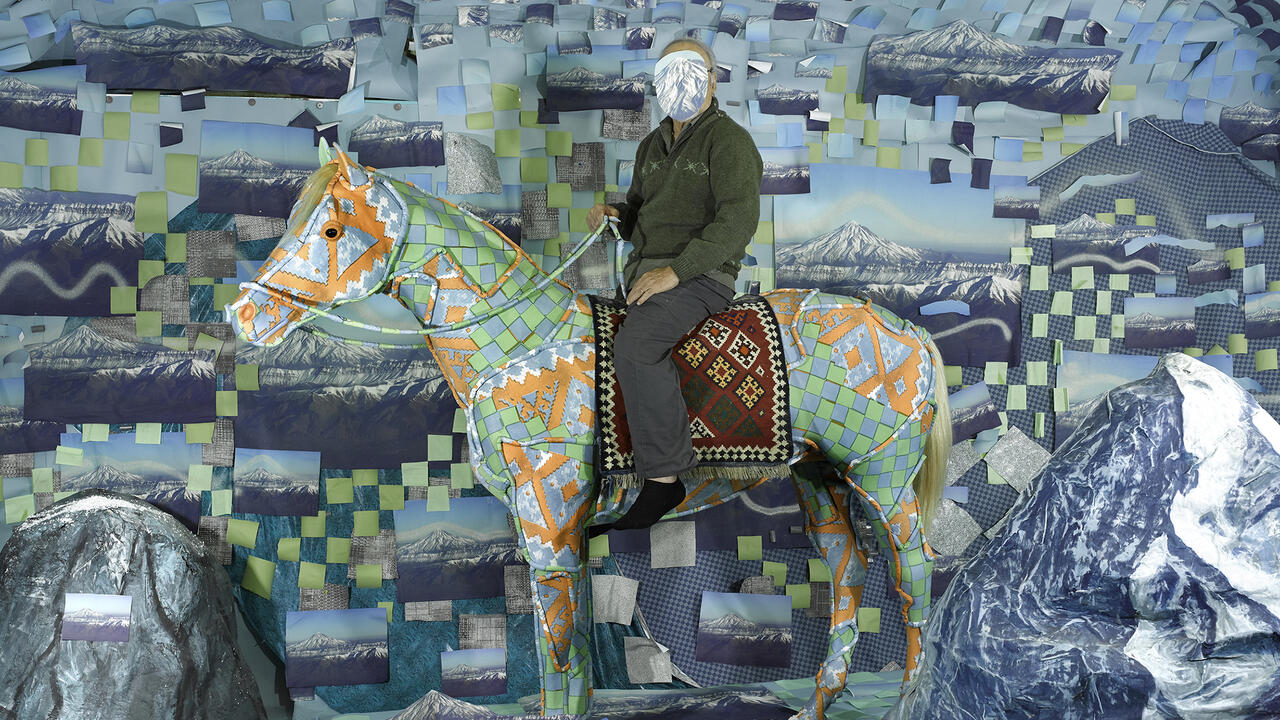Sim Life
We need to get out more
We need to get out more
'We have responded to time pressure by adopting a mode of behaviour which makes the time we do have at our disposal more intense. Even in our leisure time we try to compress things into smaller bursts.' - Stanton P. Newman and Susan Lonsdale. 1
It is now possible - if you live in a major city and have access to the Internet - to stay alive indefinitely without leaving your house. Several major supermarkets' online stores will deliver food to your door; clothes, books, CDs and videos can all be bought over the net. For more active entertainment, there are thousands of videogames to choose from and millions of web surfers to play against. This is an extreme scenario, but one that the inhabitants of technologically advanced countries are moving closer towards. Many of us work on computers all day then come home and play (in whatever sense) on computers. The irony is that the greater degree to which computers infiltrate our lives, the more we use them - not to escape the everyday world, but to somehow reclaim it.
One current manifestation of this is the work simulation. Once upon a time, people went to the arcade to blast aliens and save the universe - now they indulge childhood career fantasies. In 1997, Japanese company Taito released the arcade game Densha de Go - a straight-faced train driving simulation. This agonisingly dull sim involves driving a train from station to station, making sure you keep to the timetable. It is now one of the company's most successful titles and its sequel was recently released to great anticipation. Sega, which a few years ago was producing exhilarating flight combat shoot 'em ups, moved on to Airline Pilots, which uses three screens to simulate the experience of landing jumbo jets in real airports. The company's most recent addition to the genre is Brave Fire Fighters, in which you take hold of a realistic-looking hose (complete with vibrating nozzle) and douse on-screen fires. Interestingly, it uses almost the same 'point at the screen and shoot' concept as the Virtua Cop series; except now you're not blowing away baddies, but hosing down living room furniture.
Career sims have hovered on the periphery of videogaming for years, their visuals too abstract and unrealistic for all but the most obsessive of geeks. Now 3D modelling and near photorealistic textures are freeing the geek in all of us. If you want to indulge an anti-career slacker fantasy and experiment with a menial job, try a virtual convenience store (you too can run a 7-11), a cycle courier simulation, or Sega's Naomi arcade game Crazy Taxi, which gives you control of a yellow cab, flying around American cities in an attempt to get as many fares a possible. The game is so popular in the UK that it's taking £1000 a week in some arcades (as the machine only costs arcade operators three grand to buy, they're welcoming this gaming trend with open wallets).
For many in the post-industrial world, there is no such thing as leisure time: traditional hobbies have to be experienced in two-minute fixes. The arcade game Get Bass was one of the formative titles in this new genre, simulating the joy of fishing, complete with different types of bait, picturesque locations and a realistic rod controller. Gone are countless hours spent watching a piece of plastic bobbing in the water, this is super-fast, hyper-fishing - a fish 'em up. The fishing boom has filtered down to the Gameboy which now has Granda Musashi RV, an angling game with its own tiny snap-on rod, allowing you to slip in a spot of fly casting on the tube journey to work.
Solitary pursuits such as fishing are not the only areas to receive the simulation treatment. If you are missing out on nightlife due to extended overtime, dancing sims such as Dance Dance Revolution 2 (which requires real dancing, not just button bashing) provide the opportunity to bop away a small portion of the night at minimal expense and without the embarrassment of being turned away from a club or caught arriving at work wasted the following morning. Other games take a more aspirational approach, allowing you to live out adolescent fantasies without the hard work. If you ever dreamt of being a rock'n'roll hero, there are musical instrument sims like Konami's Guitar Freaks (featuring a realistic guitar controller with buttons instead of frets and a rocker switch to strum) and Drum Mania (complete with drum pads).
The fad for hobby simulations is re-shaping the videogame industry and some of the old guard just can't keep up. Namco, famous for big, bold games like Tekken, Air Combat and Ridge Racer, this year released Angler King (a barely disguised take on Get Bass) and Guitar Jam (a barely disguised take on Guitar Freaks). Likewise, Jaleco recently clashed horns with Konami because its new coin-op VJ bore a striking resemblance to the latter's Beat Mania. Only Konami and Sega have properly prepared for this new desire for real-life simulation. It is perhaps no surprise that this genre should appear first in Japan - a country notorious for long working hours. The Western media often, somewhat xenophobically, depicts the Japanese salaryman as a mindless worker bee, but so many white collar workers are now dying through overwork that the term karoshi has been coined to describe the phenomenon. (Earlier this year, the Japanese government was forced to pay compensation to the family of Mori Iijima who routinely worked 80 hour weeks until he took his own life.) In such a climate of furious productivity it is perhaps natural that the arcades are filled with people who want to fish, play music and socialise, rather than shoot things.
But the West is quickly catching up with this frenetic pace. In the computer industry, at least, the geek is chic. Silicon Valley exposés like Robert X. Cringely's Accidental Empire: How the Boys of Silicon Valley Make Their Millions, Battle Foreign Competition, and Still Can't Get a Date (1992) or Po Bronson's Nudist on the Late Shift: And Other True Tales of Silicon Valley (1999) are filled with anecdotes about programming entrepreneurs working all night, sleeping under their desks and going without showers for weeks on end. This doesn't just happen at the glamorous end of the computer business: for every Bill Gates or Jon Romero, there's a million code monkeys, tech support nerds, product testers, network support engineers and systems analysts who also do 16 hour days and arrive home with bloodshot eyes and body odour that could kill a horse. And who's there to meet them? Increasingly, the answer is no one. Modern work practices haven't just robbed workers of their hobbies; they've robbed them of their emotional lives as well.
The virtual pet phenomenon, which swept the West a while ago and still survives in Japan, could only take place in a world where real relationships just aren't happening. Tamagotchi crèches, Tamagotchi muggings, Tamagotchi deaths (last year a woman in France drove into a tree while she was attending to her bleeping e-pet) simply have no place in a sane world. But simulated 'relationships' are filtering into console games too. The forthcoming Dreamcast title Sonic Adventure allows you to download a selection of cute little creatures in to the machine's Visual Memory System - a handheld device that fits into the Dreamcast controller. You then feed and look after the beasts before uploading them back into the game and racing them against each other. Inevitably, future console titles will feature similar forms of interactive content.
That there is a real desire to form relationships - however technologically mediated - is evident from the popularity of Internet multiplayer games such as Ultima Online and EverQuest, which provide players with a virtual Tolkien-esque world in which they can meet new people and embark on quests together. Even traditionally confrontational genres like the first person shoot 'em up are now encouraging team co-operation. Games like Half Life Team Fortress and Star Siege Tribes, for example, encourage teams to fight against each other using complex group strategies. There are now hundreds of Quake and Half Life clans on the internet with their own rules and websites. The clans play online and then fill the chat rooms with aimless boasting and random expletive-filled outbursts. Many American teenagers, alienated by the hideously hierarchical nature of school, find solace in the anonymous brotherhood of the Internet. For them, the web is their life.
Videogames can provide a substitute for social and romantic interaction - a kind of emotional methadone - and this is a symptom of a world handing itself over to technology. Cultural anthropologists call it urban alienation: there are no extended communities anymore, people spend all their time at work, stuffed in the solitary confinement of the cubicle, and are just not meeting other people. Ask any estate agent and they'll show you the evidence: more people than ever are now living alone. Not that they notice their alienation of course, they're much too busy.
1. Stanton P. Newman and Susan Lonsdale, Human Jungle, Ebury Press/Channel 4 Books, London.

















